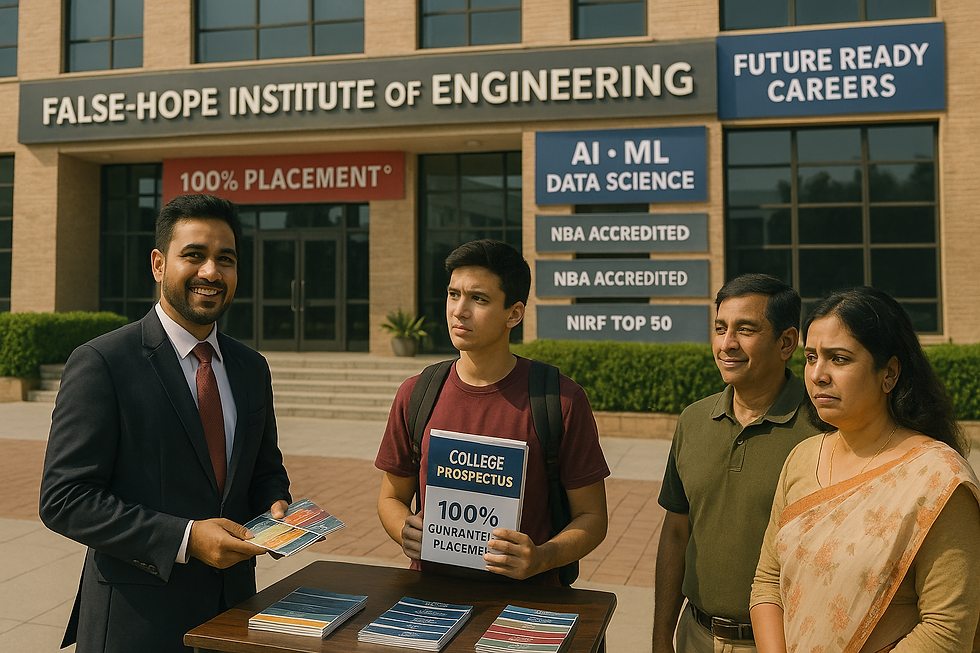Does Your Degree Say AI or ML? You Might Not Be Eligible for Some Jobs or Exams
- Dr. Deepessh Divaakaran

- Aug 18, 2024
- 3 min read
The evolution of engineering education in India has led to the creation of specialized programs focused on cutting-edge fields like Artificial Intelligence (AI) and Machine Learning (ML). While these programs are designed to equip students with the skills needed for future careers, they are also inadvertently creating barriers to employment and higher education. As an expert in higher education, it is crucial to examine this issue from multiple perspectives, including the impact on employability, the relevance of curricula, and the need for policy reforms.

The Promise and Pitfalls of Specialized Engineering Programs
Specialized engineering programs have been introduced to keep pace with rapid technological advancements. Institutions offering these courses argue that they prepare students for emerging industries by focusing on niche areas like AI, data science, and blockchain. However, graduates from these programs often face a harsh reality: many government jobs and postgraduate programs do not recognize their degrees. This discrepancy arises from outdated eligibility criteria that fail to account for the rapid evolution of engineering disciplines.
Employability Challenges
The primary goal of any engineering program is to produce employable graduates. Yet, the introduction of specialized programs has led to an unintended consequence—graduates who are ineligible for many traditional job roles. For instance, in 2023, a group of students who completed a specialized B.Tech program in AI from a reputed Indian university found themselves ineligible for government engineering exams that required a degree in traditional branches like Computer Science or Electronics Engineering. Despite their advanced knowledge in AI, they could not apply for these roles, highlighting the gap between education and employment opportunities.
Curriculum Relevance and Industry Needs
The disconnect between industry needs and academic curricula is another critical issue. While industries increasingly demand expertise in AI, ML, and other advanced technologies, many academic programs remain rooted in traditional engineering subjects. For example, a major IT company in India recently reported that their hiring processes often overlook candidates with niche specializations because their degrees are not recognized by standard accreditation bodies. This issue is exacerbated when these graduates seek to further their education abroad, where traditional engineering degrees are still the norm for admission into postgraduate programs.
The Need for Policy Reforms
To address these challenges, there is an urgent need for policy reforms. Regulatory bodies, including the All India Council for Technical Education (AICTE) and the University Grants Commission (UGC), must update their eligibility criteria to reflect the changing landscape of engineering education. For example, in 2022, the AICTE made strides by allowing AI and ML courses to be listed under the broader umbrella of Computer Science Engineering. However, more comprehensive reforms are needed to ensure that graduates of specialized programs are not left behind. Additionally, industries must collaborate with educational institutions to ensure that curricula are regularly updated to meet current and future workforce demands.
The rise of specialized engineering programs in India reflects a broader trend towards aligning education with industry needs. However, without corresponding changes in policy and recognition, these programs risk creating a generation of graduates who are highly skilled but ineligible for many traditional career paths. Real-world examples, such as the AI students who faced eligibility issues in 2023 and the hiring practices of major IT firms, underscore the urgency of these challenges. As an expert in higher education, it is imperative to advocate for reforms that ensure these innovative programs fulfill their promise of enhancing employability while also being recognized by regulatory bodies and employers. This will require collaboration between academia, industry, and policymakers to create a more flexible and responsive education system that can adapt to the evolving demands of the job market.




Comments